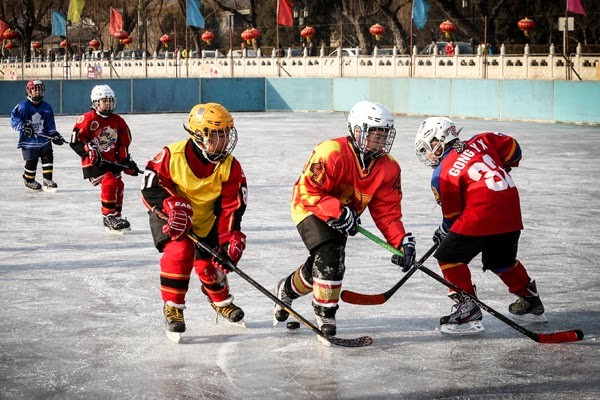Bejing sees a surge of popularity in ice hockey as more than 2,000 scions of well-to-do families don their hockey uniforms to play and compete every week.
Although the sport is tiring and rough, these children from the Tsinghua University Primary School convene three times a week at the Dreamport Mall in north Beijing in order to train and play full-contact hockey.
"I like playing ice hockey because it is fun and it looks so cool," said 10-year-old Wen Bocheng as he watched the national women's team compete against Slovakia. Wen and his friends cheered on as the women gave their best.
Beijing has been pushing the women's team to make the 2022 Winter Olypics, and the rigor has given a new-found popularity to the sport in Beijing, with a growing number of families giving their full support. Parents have seen how hockey has helped their children stay healthy and build their character.
"In the beginning, we were kind of worried about the frequent body checks, but watching him working hard at something he loves at a young age, learning discipline and teamwork, there's really nothing you can do but support him," said Wen Quan, Bocheng's father.
Wen Bocheng and his teammates are among the 2,000 youths in 96 junior hockey clubs registered to play with the Beijing Ice Hockey Association's Minor Hockey Premier League.
"Given that students lack outdoor exercise in winter and are under intense pressure academically, it's a great boost to physical education on campus," said Huang Kan, commissioner of the Beijing Municipal Education Commission, and supporter of the new hockey movement.
"Playing team sports such as hockey will help build character and improve the students' physical health," Huang added.
The support of the families is significant. Traditionally, the Chinese government supports athletes for the Olympics through a rigorous talent selection process. However, this approach has left a dearth of talent in the hockey field, as China withdrew support from costly team sports in the early 2000's in order to focus on individual sports like figure skating and speed skating.
"It takes a long time and a lot of money to cultivate a group of talents to produce elite results in ice hockey," said Tong Lixin, deputy director of China's State Winter Sports Administrative Center. The perception is that it is cheaper to fund individuals and produce more results in this manner.
"A lot of local sports officials didn't bother investing time and money in it as they wanted to see instant results in the four-year Olympics cycle," Tong added.
In seeing a jump from state-sponsored to family-supported, there is hope to see the sport of hockey rise again in China.



























